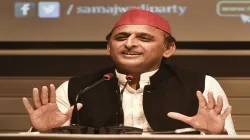Lok Sabha elections 2024: After Apna Dal-K, Janvadi Party-Socialist cuts ties with Samajwadi Party
Lok Sabha elections 2024: Janvadi Party is a party without a mass base in Uttar Pradesh, with not a single MLA in Uttar Pradesh presently. The Janwadi Socialist Party had contested elections with the support of the BJP in 2007 and 2012, but could not get a single seat in the state.

Lok Sabha elections 2024: The Janvadi Party (Socialist) severed ties with the Samajwadi Party today (March 23) amid the differences between the alliance partners. Announcing the decision, founder and national president of the Janvadi Party (Socialist), Sanjay Chauhan said, "There was a dispute between the Janvadi Party (Socialist) and the Samajwadi Party over the distribution of seats."
This comes days after the Samajwadi Party split with the Kurmi OBC-based Apna Dal (Kamerawadi). Now, the Janvadi Party is free to declare its candidates for 11 seats in Uttar Pradesh. Sanjay Chauhan's party had contested the elections in 2022 in alliance with the Samajwadi Party but could not win a single seat. Janvadi Party is a party without a mass base in Uttar Pradesh, with not a single MLA in Uttar Pradesh presently. The Janvadi Socialist Party had contested elections with the support of the BJP in 2007 and 2012, but could not get a single seat in the state.
Responding to a media query on Thursday (March 21), SP president and former chief minister Akhilesh Yadav said, "We were in alliance with Apna Dal (Kameravadi) in the 2022 assembly elections but it is not in 2024."
The Apna Dal (K) had announced that it would field three candidates for the upcoming Lok Sabha polls. The seats they planned to contest were Phoolpur, Mirzapur and Kaushambi in eastern UP. All these seats were won by the BJP in 2019. The Samajwadi Party on Wednesday evening also announced six more nominees for the general elections, including a candidate for Mirzapur, which the Apna Dal (K) had claimed for itself.
UP will vote in 7 phases
The Lok Sabha election 2024 in Uttar Pradesh will be held across seven phases from April 19 to June 1 and the counting of votes will take place on June 4. In the 2019 elections, the saffron party had won 303 seats alone. The vote percentage of the BJP was 50 per cent, BSP 19.4 per cent, SP 18.1 per cent and Congress 6.4 per cent.
Rift between SP and Apna Dal (K)
The rift between the two parties came to the fore when Apna Dal (K) leader and SP MLA Pallavi Patel refused to vote for two SP candidates in the February Rajya Sabha polls, saying that the SP had ignored its own PDA (Pichda, Dalit, Alpasankhyak) formula in its choice of candidates. She eventually claimed she had voted for the only Dalit among the three SP candidates.
Before the 2022 state polls, the SP had formed an umbrella alliance with several smaller parties, including the Apna Dal (K), Jayant Chaudhary's Rashtriya Lok Dal (RLD), Keshav Dev Maurya's Mahan Dal, and Om Prakash Rajbhar's Suheldev Bharatiya Samaj Party (SBSP). The RLD and the SBSP have deserted to join the BJP-led NDA, while the Mahan Dal has offered support to the BSP.
ALSO READ: Lok Sabha polls: Bhim Army chief Chandrashekhar to contest against Samajwadi Party in Uttar Pradesh
ALSO READ: Gujarat: Two BJP candidates express reluctance to contest Lok Sabha elections